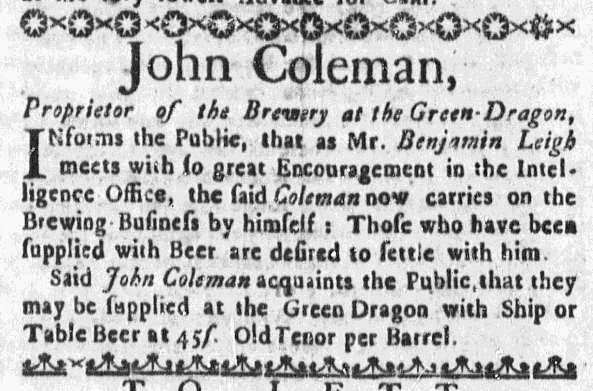What was advertised in a colonial American newspaper 250 years ago this week?

“Mr. Benjamin Leigh meets so great Encouragement in the Intelligence Office.”
In late July 1768, Benjamin Leigh began advertising an “Intelligence Office” at the Green Dragon Tavern that he opened “For the Benefit of the Public.” According to David Van Arsdale, “Intelligence offices in British North America shared many similarities with their English forebears.” Among them, they “continued operating in close relation to coffeehouses and centers of investment and commodity exchange, and continued providing employment services to the unemployed and seekers of their labor.”[1] In addition, Leigh listed a variety of other services associated with intelligence offices. He practiced discretion when facilitating transactions between those who had “money to lend” and others seeking to borrow. He also introduced those with “Merchandize Goods, Vessels, Lands, Negroes or Servants to sell,” rent, or charter with buyers or tenants. Beyond providing “employment services,” the men who operated intelligence offices were enmeshed in the slave trade, trucking in enslaved men, women, and children who were the objects rather than the beneficiaries of the assistance they provided in the world of colonial commerce.
Van Arsdale comments briefly on efforts to promote intelligence offices in the public prints, noting that Leigh and his counterparts in the colonies followed the example set in London by continuing to generate business through advertising. By the time Leigh informed readers of multiple newspapers published in Boston of his intelligence office at the Green Dragon Tavern, John Coghill Knapp had been advertising his services to residents of New York for several years. His frequent notices became a fixture in several newspapers. Van Arsdale also indicates that those who ran intelligence offices “often advertised … the success of English office as a way of establishing credibility and conjuring up business.”[2]
Leigh did not adopt that strategy in his own advertisements in the Boston-Gazette and the Boston Weekly News-Letter when he first opened his business, but evidence of the success of his new business did appear in advertisements printed elsewhere on the page. An advertisement placed by his former partner testified to the success of Leigh’s new endeavor. Shortly after Leigh began inserting his own notices, John Coleman, the “Proprietor of the Brewery at the Green-Dragon,” published a separate advertisement informing current and prospective customers that because Leigh “meets with so great Encouragement in the Intelligence Office” Coleman now ran the brewery on his own. In the August 4 edition of the Boston Weekly News-Letter, Coleman’s notice appeared one column to the right and just above Leigh’s advertisement. The proximity made it that much easier for readers to connect the messages delivered in each. Unlike many of his counterparts in the colonies, Leigh did not attempt to convince prospective clients that they should avail themselves of his services because intelligence offices on the other side of the Atlantic delivered results. Instead, another entrepreneur in Boston asserted the early success of Leigh’s enterprise, assuring potential clients that the system did indeed work in that busy port city.
**********
[1] David Van Arsdale, The Poverty of Work: Selling Servant, Slave and Temporary Labor on the Free Market (Brill, 2016), 85.
[2] Van Arsdale, Poverty of Work, 86.
